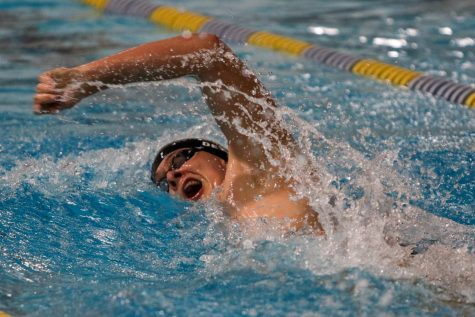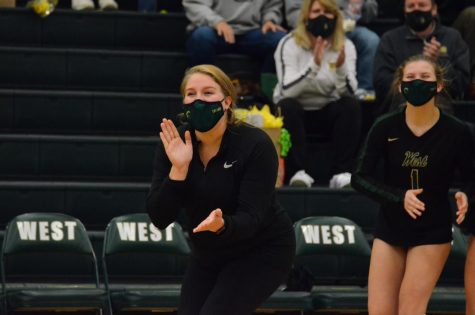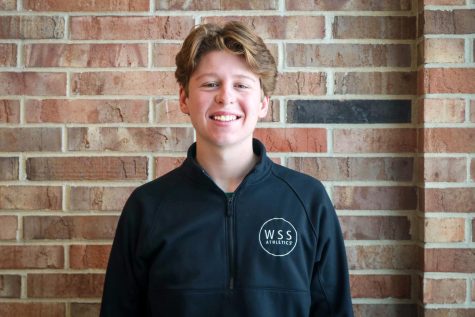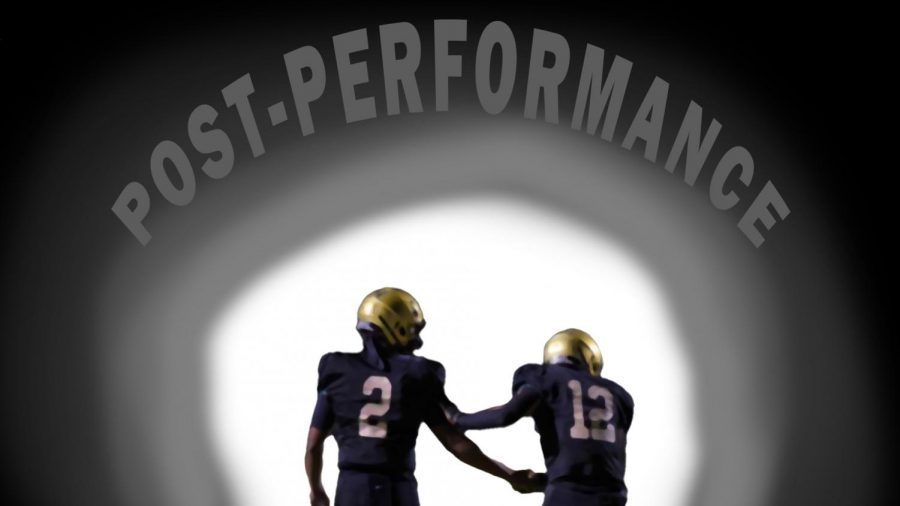Post-performance
There’s a lot that fans don’t see at a swimming meet or football game. They’re not around to witness the grind leading up to the competition, the extra reps or what goes on in athletes’ minds on or off the court.
After stepping off the court or getting out of the pool, being unsatisfied with a performance is difficult to overcome for athletes. Learning how to handle these off days is what separates novice athletes from the elite.
When parents first sign their children up for a recreational soccer league or for tennis lessons, kids probably don’t think of it as much more than an activity that takes up a couple of hours of their week. But as amateur players grow into dedicated athletes willing to pour more than a few hours of time into strengthening their game, their craft turns into a lifestyle. Balancing school and life can be hard enough without the mental and physical strain that can come from high-level sports. However, when athletes are committed to playing at the next level, habits to cope with this load tend to form, for the better or worse.
High-level sports can often cause frustration. Everyone has a bad day, but for athletes, these can be tough to handle. After stepping off the court or getting out of the pool, being unsatisfied with a performance is difficult to overcome. Obsessive thoughts, overtraining, or lacking confidence can overtake them. Instead, learning how to handle these off days is what separates novice athletes from the elite.
“Getting frustrated with how I was doing in a meet or in practice would always motivate me to practice more on my own and be more diligent during practice,” said Nathan Deyak ’21. Deyak is a varsity football player, swimmer and track and field thrower. With this amount of exposure to athletics, he’s learned how to utilize frustration to improve his performance.

“I don’t dwell on bad performances very often, I try to just learn what I can from them and move on to focus on the next objective I’ve set,” he said. “During the football season, I got frustrated a lot at times with low snaps, so I would always come early to practice to snap on my own, and try to come a few times during the week outside of practice to get extra practice to hone my technique and regain my confidence.”
More importantly, Deyak’s incremental mindset is the main contributor to his athletic success.
“My overall aspirations are to prove to myself what I can do, but in the short and medium-term, I can find myself wanting to prove things to others or to meet certain marks, instead of just doing my best without worrying about what arbitrary benchmarks I can meet.”
Motivation can be hard to find for some athletes, but Deyak creates his own. While teammates or friends set the bar, he consistently tries to raise it.
“I like to think that I’ve pushed myself the most, but I’ve been encouraged a lot by teammates and former teammates, trying to achieve what they’ve done or work as hard as they did, or simply by being more motivated by their encouragement,” he said. “My parents have also encouraged me a lot, and sometimes I think they care about my sports even more than I do.”
Athletics are key in teaching valuable lessons that can be used off the court and even in the classroom.
“I think sports have greatly impacted my life for the better. I’ve gotten a lot healthier physically, made a lot of friends and gotten out of my shell, and become mentally tougher and more disciplined,” said Deyak. “This mindset has affected how I do schoolwork, too. More and more I try to appreciate the work my teachers are doing and to make the most of what they are providing instead of slacking off and trying to do the bare minimum to get an A.”
Tennis player Ella DeYoung ‘23 used to struggle a lot with the pressure to please herself and others while playing. After changing her mindset, she has come to enjoy her sport even more than before.
“I’ve come to realize that my purpose for doing certain things shouldn’t be to please others,” DeYoung said. “In the past couple of years, I’ve focused more on playing tennis for myself rather than playing tennis to please others or meet others’ expectations, and it has made the whole experience a lot more enjoyable and worth my while.”
DeYoung also continues to struggle with overcoming challenges, including getting past a match she wasn’t proud of.
“Some of my bad performances have stuck with me for years. I don’t like to admit that, but when I’ve had a particularly bad performance, I find it quite hard to get over,” DeYoung said.
There are two options when it comes to handling bad performances: sulk or succeed. When athletes are met with an off day, most high-level players know that in order to grow, you have to take those frustrations and learn from them.
“Players are frequently frustrated after their performance, win or loss, and I think that that’s okay. You know, when you’re thinking about big games and there’s nothing that comes after that, like a championship or going to state, it’s okay to kind of wallow in those losses and to think about it,” said Head Volleyball Coach Keeley Arnold. “But a lot of times when you’re thinking about any sport in general, but more specifically volleyball, players do get frustrated, but growth comes from that frustration when we can learn how to use those poor performances as a stepping stone to get better.”
While acknowledging off-days and what can be improved, be mindful to not obsess too much. When too immersed in errors, no more growth can be made.
“There’s definitely room to allow yourself to feel that feeling of, ‘Wow, I didn’t perform as well as I could have, I could definitely do better.’ You can allow yourself to feel that, but you can’t sit in that state because then you become stagnant,” she said. “A lot of that does go back to mindset, and so when you’re thinking about making growth, you can only get as good as you think that you can get…you set your own ceiling. We look at what went well, what went wrong and how we’re going to make growth from that situation. And I think if we can instill that in athletes, then hopefully they’ll start thinking that on their own and then that comes that intrinsic motivation.”
The majority of sports incorporate both aspects of individual and team mentalities. In volleyball, however, the singular errors are magnified in a single set to twenty-five points.
“When I think about volleyball, it’s a team sport, so there’s a lot of things that rely on the person next to you to make the first contact and you to make it better. But there are also a lot of aspects of volleyball in which it’s kind of a one on one skill that you have to be able to get your serve in, to terminate, to make the best of the ball that’s given to you,” said Arnold. “So it takes a lot of mental strength to be good at volleyball. And volleyball is a game that revolves around errors, that is how you either lose your points or gain your points from the other team’s error.”
Accepting these errors and the fact that every game, practice and competition isn’t going to be perfect is what will help an athlete in the short term and the long run.
“You know, everybody has a poor performance, everybody has a bad day. You got to let it go and move on. When it comes to those big losses I talked about earlier like the ones that you can’t get back…you can sit in those, but then you have to know that all of the skills that you’ve learned through that one performance can be used beyond it. There’s gonna be another chapter of your life and it might not be that same sport, but it’s definitely something that will open a door to something else, like it’s never just the end of it,” said Arnold.

Without the necessary mental fortitude, these indefinite errors can build up and take the joy out of the sport.
“During practice I would get frustrated all the time. What often made me upset wasn’t my performance itself, it was when I wanted to mentally pick myself back up, but couldn’t figure out how to do that,” said junior volleyball player Maria Kazembe.
“I think about my performance in volleyball a lot, both on and off the court. One of the categories I would put myself in is being a perfectionist, making mistakes is something that’s hard for me to deal with, but volleyball is a game of mistakes so it’s inevitable,” she said. “During the volleyball season I would think about previous mistakes all the time: as soon as I made them, the rest of my time on the court, and even when I went at home.”
When an athlete’s mind starts cracking down on every mistake, it’s important to find an outside source to marginalize the ‘bad’ performance and give impartial feedback. Kazembe along with other athletes use this strategy to keep improving their game.
“When you’re in a rut, such as recovering from what you may consider a bad play, go back to the basics and build yourself up from there. Take it one step at a time so you can rebuild your confidence in yourself,” she said. “I’ll ask my coach and teammates what I did well during that game and what I could do better for the next game. I really value their input and it helps me become a better teammate and overall player.”
The bond between teammates is critical in team sports to establish trust and to work towards a winning culture. Creating a good team atmosphere determines wins and losses, and most importantly can form a family on and off the court.
“Honestly, I work hard to prove something to others. I want my teammates to know that I have their back and if they make a mistake that I’ll be there to back them up. I also want my coaches to know that picking me to play that position or be on their team was the right choice, that I’m the right player for the job,” Kazembe said. “Through volleyball I’ve acquired motivational skills that help me everyday, like pushing me to complete an assignment and learning not to give up. I’ve also met people that I consider to be very important to me. I have so many great memories that I wouldn’t have been able to get anywhere else.”
After Arnold’s squad ended the season 13-15 in the second regional round, Arnold and her team were immediately ready to grow and come back stronger next season with a new mentality.
“One of my favorite ideas I came across after the season was WIN mentality, and WIN is an acronym that stands for, ‘What’s Important Now.’ I think it’s really easy to focus on the mistakes that you’ve made or, you know, the big opponent that’s going to come, but you have to have that WIN mentality. You have to think about what’s important now, like getting a pass or getting in the reps, or focusing on those small goals that we’ve talked about at practice too,” said Arnold. “You have all the control in that situation. What’s important now.”
Every athlete is different in handling good or bad performances. Some just let loose and leave it all on the court while some like to think more about what to do and how. The most important part of athletics is why it was first picked up: the love of the game. So if you’re unhappy with your performance, remind yourself that you always have the next practice to play with a passion.
Your donation will support the student journalists of West High School. Your contribution will allow us to purchase Scholarship Yearbooks, newsroom equipment and cover our annual website hosting costs.

(she/her) Camille Gretter is a senior at West High and this is her third year on staff. She is the Online Editor-in-Chief, and outside of West Side Story...

(she/her) Alaina Greenlee is a senior at West and is in her second year as the WSS Video Editor. Between creating half-decent videos and being below average...

Owen Aanestad is a senior at West. This is his third year on staff working for the online publication as the online editor-in-chief In addition to playing...

(she/her) Alyssa Skala is a senior at West. She is a third year photographer on staff and a second year editor for yearbook. When she doesn't have her...





